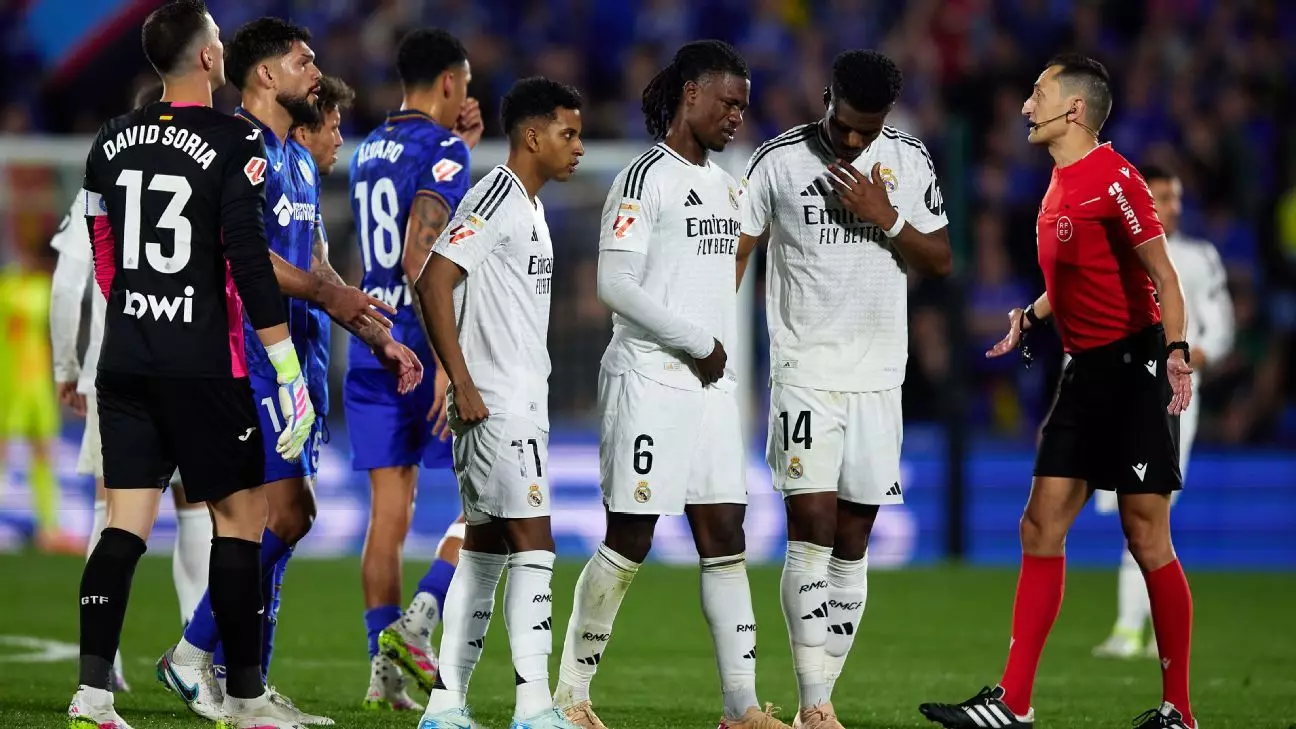Real Madrid finds itself at a critical juncture as it gears up for the Copa del Rey final against its arch-rival, Barcelona. Coach Carlo Ancelotti recently expressed his concerns over the fitness of key players David Alaba and Eduardo Camavinga. Both players picked up injuries during a hard-fought 1-0 victory over Getafe, igniting anxieties within the team as they approach a pivotal clash. Alaba’s discomfort forced an early substitution, and unfortunately, Camavinga had to exit the game late due to his own complications, leaving Madrid to finish with ten men.
The challenge of replacing these players cannot be understated; with Ferland Mendy still on the road to recovery, Fran García is set to step into the left-back role—a position that carries its own set of challenges during such high-stakes games. Ancelotti’s admission that recovery will be “difficult” speaks to the physical and mental strains that come with such an intense schedule. The need for cohesive performance becomes even more pronounced when the pressure to reclaim titles intensifies.
The Psychology of Finals
As Ancelotti noted, finals carry an unpredictability that can often work in favor of the underdog. Despite being behind Barcelona in the La Liga standings, the prospect of silverware could galvanize Madrid’s spirit. The historical narratives and rivalries that define the encounters between these two giants of Spanish football add layers of complexity. Fans and critics will question whether Barcelona may have the upper hand, but often within a final, emotions overshadow conventional wisdom.
Ancelotti’s experience in managing high-pressure situations could be vital. Historically, finals are not necessarily determined by form or statistics but by heart, strategy, and sometimes sheer luck. Madrid’s loss in the Champions League recently may have impacted morale, but it can also serve as fuel for redemption. When lives are at stake on the pitch, teams tend to unleash their best versions, often defying odds in remarkable ways.
The Future of Young Talents
Another bright spot amidst the injuries is the emergence of young talent, especially Arda Güler, who made a significant impact by scoring the decisive goal against Getafe. Ancelotti’s comments reveal a thoughtful approach to the player’s development. By recognizing Güler’s strengths in midfield rather than a forward position, the coach is taking a long-term view that could redefine how Real Madrid employs its young arsenal going forward.
Güler’s technical skills and ability to control the game suggest that he may hold the key to Madrid’s success in reestablishing dominance in Spain and Europe. Finding the right position for a player is crucial, and Ancelotti’s strategy could prove instrumental, not only in the upcoming final but in Madrid’s future campaigns.
An Emotional Atmosphere in High-Stakes Encounters
Between the pitches, the emotional and psychological atmosphere also plays a fundamental role. The volatile fan experiences were apparent during the game against Getafe, where Dani Ceballos faced hostile chants from the home crowd. Such moments add pressure to the players, but they also serve as a reminder of the fierce loyalty and passion that characterize football. In high-stakes matches, players must cultivate mental resilience to focus on the game rather than external distractions.
Each aspect – the injuries, the managerial strategies, the emergence of young talent, and the emotional weight of fan interactions – culminates in a pivotal moment for Real Madrid. This final could either resurrect the season from a series of setbacks or reaffirm the team’s shortcomings. As they prepare to face Barcelona, the question remains: will resilience conquer adversity on the grand stage?

Leave a Reply